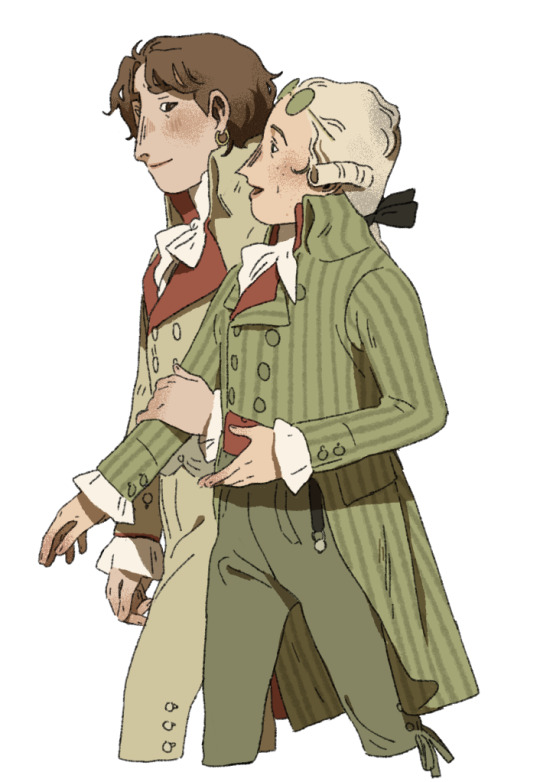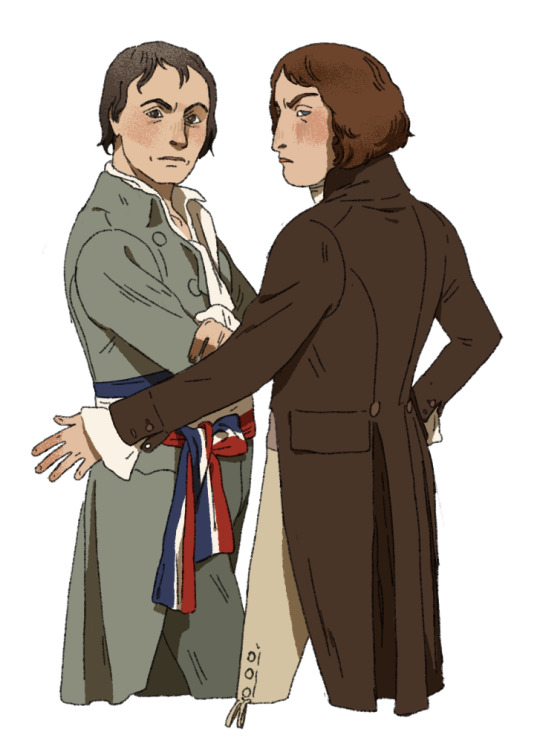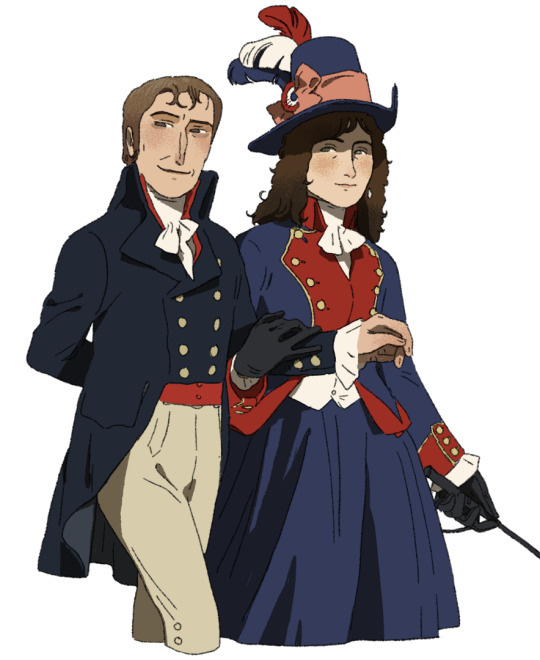#collot d'herbois
Explore tagged Tumblr posts
Text
random French Revolution stuff I found today
article from 1911 about the deaths of the Dantonists (starts halfway down the linked page, continues on following)
Barère’s report on the attempted assassination of Collot d’Herbois
government-released report on the arrest of Robespierre (among other random events from 9 Thermidor)
a bunch of weird-as-hell satirical poetry that Desmoulins wrote
a speech that Desmoulins gave about the idea of the war
there’s no theme here I just dug up some things and thought I would share!
26 notes
·
View notes
Text
I again decided very late at night to make smth very silly









#Im pm doing this cos I love the pun lol#I've drawn collot esp badly cos I dislike him that much lmao#I dont know when I'll make pt 2 yet#french revolution#frev#robespierre#maximilien robespierre#louis antoine de saint just#saint just#committee of public saftey#collot d'herbois#billaud varenne#herault de sechelles
170 notes
·
View notes
Text
On November 4 (1777), the people of Montpellier attended a performance of Lucie: ou les parents imprudents (a play of Collot’s) given by a troupe from Avignon or Marseille, in which d'Herbois appeared in the leading role. During the intermission which follows his drama and precedes a small play, Collot d'Herbois goes to one of the boxes where a spectator compliments him on the success of his play. He answers:
...that in truth five or six hundred people found his play excellent, but that five or six dressed in black found it bad, that it was unfortunate but that what's more, these people barely knew how to read the posters, that for him he honored his state and these people dishonored theirs.
Other witnesses add that he said out loud that he wanted to "maintain a public argument with these people [...]", and that this did not fail to trigger a rumor in the dressing rooms. The audience in these boxes is essentially made up of privileged people and several testimonies attest to a real cabal against Lucie, strongly criticized by the occupants of the boxes, even though one heard "applauding of said play from the floor [...]".
After the little play, in which he also starter, Collot d'Herbois, still dressed in his stage costume and with a sword at his side, finds himself facing two of these "black coats.” The tone quickly rises to a real exchange of insults. One of the two men, named Dupin, ”asked him if he had anything to say to him, since he was looking at him in such a marked way.”
”No,” replied said d'Herbois, ”But can't one look at you?”
”But you don't look at people that way,” M. Dupin then told him.
”Why is that,” adds d'Herbois, ”the truth is that I find you very pleasant to look at [...].”
The second person then intervenes and blurts out this sentence of aristocratic contempt:
”Monsieur, you are an author and actor, go back, Monsieur, to your estate.”
Collot, far from being impressed, responds in a louder tone: ”... yes I am an author and actor, I find glory in it, I honor these states and those who speak to me dishonor theirs [...].”
The two "black coats", one Treasurer of France in the Generality of Montpellier, the other advisor to the Court of Aid of this city, did not stop there and had the audacious one summoned to the major commanding the place. As one asks him for an apology,
”... he refused to and added to this resistance a tone of ridicule and irony which aggravated the insult [...].”
Sent to the jails of the citadel, then before the courts, Collot no longer had a choice and made amends, pledging to "be more circumspect and restrained in his words and writings in the future [...]" .
This affair therefore had no significant consequences, but it reveals two essential things. On the one hand, the young man only puts down his guns at the last moment and postpones as far as possible the moment when he will have to bow down, to comply with this strict hierarchy of the Ancien Régime. On the other hand, his Lucie certainly has a smell of sulfur for the privileged and it is certainly no coincidence that the witnesses who come to overwhelm it all come from wealthy backgrounds.
Collot d’Herbois: légendes noires et révolution (1995) by Michel Biard, chapter 3.
—
Collot… what’ya doing man… 😏
#happy birthday collot!!#was telling a stranger you find them pleasant to look at seen as more straight in the 18th century?#Collot d’herbois#frev
19 notes
·
View notes
Text

accurate depiction of the committee of public safety
#frevblr#frev#frev art#french revolution#robespierre#maximilien robespierre#collot d'herbois#committee of public safety#i saw a description of robespierre having a cat like face#i ran w it
153 notes
·
View notes
Text



Happy Valentine's Day!
#french revolution#personal work#personal art#robespierre#saint just#charlotte robespierre#fouche#billaud varenne#collot d'herbois
985 notes
·
View notes
Note
fouche and collot?

they’re discussing the logistics of blowing people up
137 notes
·
View notes
Note
fouché and collot perchance

GOD BLESS YOU ANON they somehow manage to be even worse when together <3
78 notes
·
View notes
Text
If you Hug different revolutionaries
Maximilien robespierre-You will feel how tiny and skinny he is. His body temperature is a bit low. He never hugs anyone tightly.
Antoine Saint-Just-His body is a bit hard since he has a strong built. But it is warm especially close to his heart.
Camille Desmoulins-He will pat you happily and lightly when hugging you, with a smile on his face. Then you'll be able to hear him humming a song.
Georges Danton-He likes to hug anyone tightly with his large arms. You can smell the odor of wine from him.
Jean-Paul Marat-He hugs you firmly. You might feel the strength of his hands. He hugs you because he trusts you deeply.
Augustin Robespierre-Recommend to hug him when it is extremely cold outside.
Lazare Carnot-You feel something wet on your head. He is crying!
Claude Antoine Prieur-A very sincere hug you will receive. He will hug you with a ruler and a compass in his hand.
Billaud Varenne-You might feel like crashing into a stone. He only hugs Collot warmly.
Collot d'Herbois-Throwing his body on you, just guess how he feels about you.
BTW, feel free to correct the mistakes from my headcanons.
#french revolution#frev#maximilien robespierre#robespierre#saint just#lazare carnot#jean paul marat#danton#camille desmoulins#billaud varenne#collot d'herbois#augustin robespierre#claude antoine prieur
95 notes
·
View notes
Text
Concept: one single 'this is our get along shirt' shirt for everyone in the CSP
#frev#the csp#maximilien robespierre#louis antoine de saint just#lazare carnot#collot d'herbois#barère#georges couthon#billaud varenne#lindet#prieur x 2#saint-andré (i always forget him)#hérault de séchelles#frev shitposting
54 notes
·
View notes
Text
When you feel fate breathing down your back...

From the Festival of the Supreme Being with future thermidorians spitting their poisonous remarks at Maxime and with Saint-Just watching the scene in the background (I know, he should not be there, but then you would not see him, because there is no other photo of him.)
And down is the rhetorical duel of Max with Danton (it was actually fun - performed inside a boxing ring)

I know I posted the link and some photos of the printed programme etc., several months ago. But I just miss this old spectacular theater play. Pity they had no better photos on the website. Or the recording to watch.
Pictures from the French Revolution.
#pictures from the french revolution#maximilien robespierre#saint just#joseph fouché#collot d'herbois#billaud varenne#frev#french revolution#festival of the supreme being#georges danton#robespierre vs danton
54 notes
·
View notes
Text

I draw slowly help💔
45 notes
·
View notes
Text
Signatures!

From left to right: Collot d'Herbois, Robert Lindet, Billaud Varenne, Lazare Carnot

The document is a requisition, requiring with reference to the Decree of 27 Germinal [16 April] that Guyot Laval, Liquidator of the National Treasure, shall be kept in his present post.
#frev#french revolution#Collot d'Herbois#Robert Lindet#Billaud Varenne#Lazare Carnot#I like signatures <3
35 notes
·
View notes
Text
I was bored and put a bunch of French revolutionaries into the Hunger Games simulator so yay! Here are my fav moments:
Maximilien Robespierre and Joseph Fouché fight for a bag. Maximilien Robespierre gives up and retreats.
Not gonna comment on this...
Jean-Paul Marat bleeds out due to untreated injuries.
Wow. That felt personal. I feel like we've been here before.
Marie-Jean Hérault kills Philippe Le Bas while he is resting.
NOT PHILIPPE!!! AND WHILE HE WAS RESTING TOO :(
Georges Couthon is unable to convince Antoine Saint-Just not to kill him.
It's right up there in 'Top 10 Anime Betrayals'.
Augustin Robespierre convinces Georges Danton to snuggle with him.
... @bonbonrobespierre weren't you talking about this too?
Lucile Desmoulins accidentally detonates a land mine while trying to arm it.
NOT MY LUCILEEEE!
Charlotte Robespierre and Jean-Lambert Tallien sleep in shifts.
Charlotte allying with someone who had a hand in the deaths of her brothers? Hm I've heard this story before... /nsrs
Pauline Léon shoots an arrow at Élisabeth Le Bas, but misses and kills Claire Lacombe instead.
Uh oh. Just killed bestie
Maximilien Robespierre runs away from Charlotte Robespierre.
@ that one time when they moved out and Max moved back into the Duplays
Joseph Fouché, Georges Danton, and Françoise Hébert unsuccessfully ambush Élisabeth Le Bas, Maximilien Robespierre and Éléonore Duplay, who kill them instead.
Reverse Thermidor? (Kind of?)
Charlotte Robespierre and Éléonore Duplay work together for the day.
Well, that's new.
Maximilien Robespierre and Camille Desmoulins huddle for warmth.
Louis-le-Grand type activity
Maximilien Robespierre and Jean-Marie Collot track down and kill Augustin Robespierre.
Oof. I'd expect this from Collot, but Maxime?? After everything? Low blow.
Antoine Saint-Just, Charlotte Robespierre, and Jean-Lambert Tallien get into a fight. Jean-Lambert Tallien triumphantly kills them both.
WEREN'T YOU AND CHARLOTTE ALLIES?? 😭😭 Tallien you're somehow worse than Fouché at this
Maximilien Robespierre bleeds out due to untreated injuries.
Déjà vu, anyone?
Marie-Jean Hérault runs away from Élisabeth Le Bas.
YEAH BABET GET HIM FOR YOU AND PHILIPPE 💥💥💥💥💥
Jean-Marie Collot repeatedly stabs Camille Desmoulins to death with sais.
... well!
Collot won. The end.
#frev hunger games#maximilien robespierre#joseph fouché#jean paul marat#herault de sechelles#philippe le bas#georges couthon#antoine saint just#augustin robespierre#georges danton#lucile desmoulins#charlotte robespierre#pauline leon#elisabeth le bas#claire lacombe#francoise hebert#eleonore duplay#camille desmoulins#collot d'herbois#jean-lambert tallien#wow that's a lot of tags#frev#frevblr#frev shitposting#also with the bonbon and danton bit:#you've heard of robeston#now get ready for bonbonton#anyways bye
30 notes
·
View notes
Text
In the french revolution fandom, we don’t talk about Lyon 💀
42 notes
·
View notes
Text

a toast to not killing each other tomorrow
103 notes
·
View notes
Text

Something tells me that this committee needs help with the amount of Earth signs here.
#frev#french revolution#csp#committee of public safety#lindet#jeanbon saint andré#collot d'herbois#carnot#barère#couthon#billaud varenne#prieur de la marne#robespierre#hérault de sechelles#prieur duvernois#saint just
62 notes
·
View notes